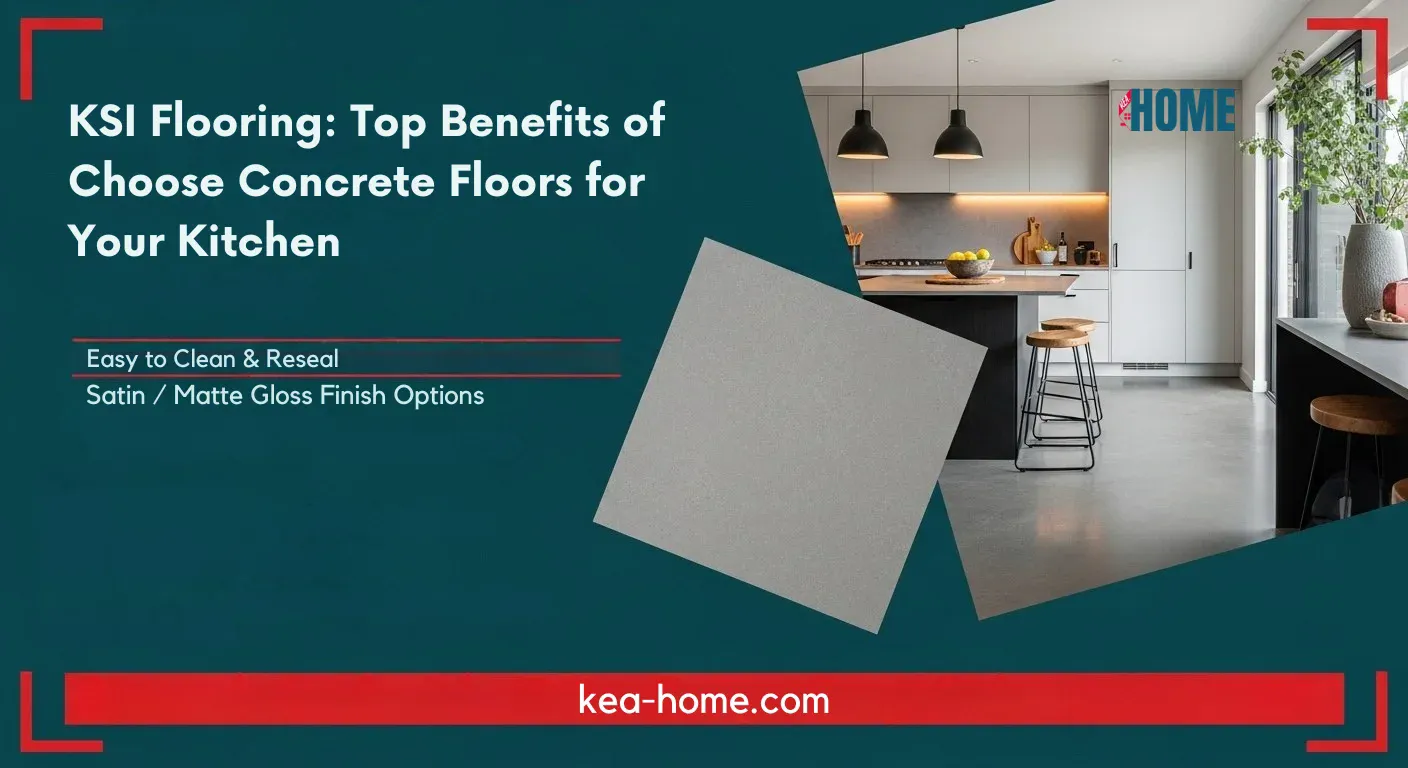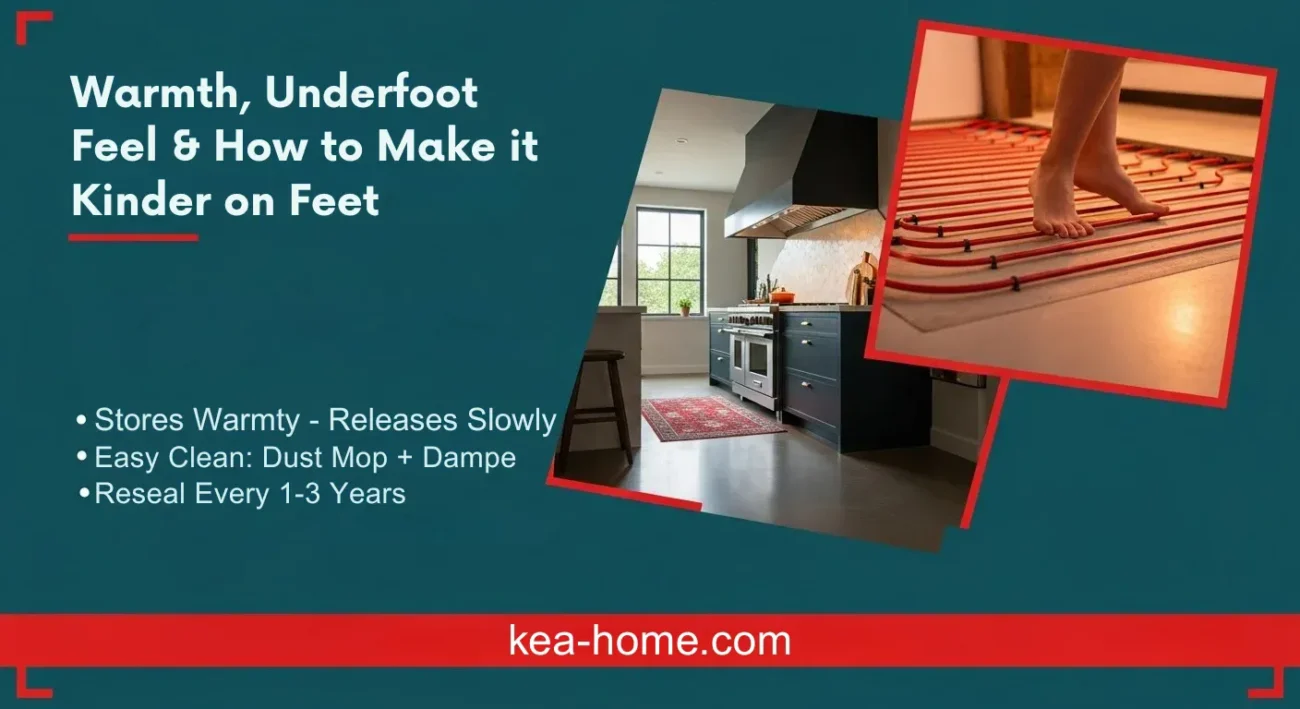
Home & Decor Blogs: DIY, Interior Design & Lifestyle Ideas
KSI Flooring: Top Benefits of Choose Concrete Floors for Your Kitchen

Kitchens are busy, messy, and full of life. If a floor can’t handle heat, spills, claws, chairs, and carts of groceries, it doesn’t belong there. That’s why so many homeowners are looking at concrete not just for garages or patios, but for the heart of the home design. From KSI Flooring, you’ll learn the top benefits of choosing concrete floors for your kitchen, how modern finishes fix the “cold and industrial” myth, what it costs, how it compares to tile, wood, and vinyl, which finishes work best, and how to keep it looking amazing for decades.
Choose the right finish is half the win. Use this table to match your taste and lifestyle:
| Finish Type | Look and Feel | Traction Tendency | Maintenance Rhythm | Best For |
|---|---|---|---|---|
| Satin/Matte Sealer | Soft sheen, hides streaks | Better traction wet | Recoat every 1–3 years | Busy family kitchens |
| Honed/Low-Gloss Polish | Stone-like, subtle reflection | Moderate traction | Dust mop + neutral cleaner | Modern minimal kitchens |
| High-Gloss Polish | Mirror-like, dramatic | Can be slick when wet | Frequent dusting to hide smudges | Showpiece islands and low-splash zones |
| Tinted Microtopping | Uniform color, crafted look | Depends on topcoat | Topcoat as directed | Make-over on imperfect slabs |
What You’ll Get From This KSI Flooring
You’ll get clear pros and honest watch outs in easy English. You’ll see two simple tables that help you choose finishes and compare materials. You’ll find real world maintenance timelines, slip resistance tips, underfloor heating notes, design ideas that don’t trap dirt, and answers to common questions. No jargon, no fluff just useful info that helps you decide with confidence.
What Concrete Flooring is in a Kitchen
Concrete kitchen design flooring usually means the existing slab is polished, sealed, stained, or coated with a microtopping. You’re not adding a fragile layer on top; you’re upgrading the strong base you already have. That’s why concrete often wins on durability, longevity, and value over time. Refinish the surface, don’t rip out the floor.
The Everyday Toughness your Kitchen Actually Needs
Concrete laughs at chair legs, pet claws, dropped toys, and daily foot traffic. Unlike softer floors, it doesn’t scratch easily, and modern sealers improve stain and moisture resistance when maintained on schedule. When tile grout lines darken and wood swells, a properly finished concrete floor keeps its cool.
The “Industrial” myth and Kitchen Won’t Look a Warehouse
Concrete can be satin, matte, or high gloss. It can be tinted to warm taupes and cozy terracottas or marbled to mimic stone. Saw cut patterns can echo large format tile without the grout headaches. Speckled finishes hide crumbs between mops. In short, concrete isn’t a look; it’s a canvas.
Warmth, Underfoot Feel & How to Make it Kinder on Feet

Concrete pairs beautifully with area rugs and anti fatigue mats in prep zones. If your space feels cool, radiant heating under or within the slab turns concrete into a gentle heat sink. The thermal mass stores warmth and releases it slowly, which is both cozy and energy smart.
Concrete is easy to clean with a quick dust mop and a damp microfiber pass. Most households refresh a topical sealer every one to three years depending on foot traffic and sheen preference; penetrating sealers may go longer. Use a pH-neutral cleaner and avoid harsh chemicals. The routine is simple, repeatable, and affordable.
“Value Over Decades” Beats “Cheap Today, Costly Tomorrow”
Polished or sealed concrete commonly lands in the mid range per square foot and avoids the cost of tearing out and disposing of existing flooring layers. The “secret saving” is long life. Where wood may need refinishing and some tiles chip or crack, concrete’s maintenance is more like touch-ups than replacements. Over ten to twenty years, that math is kind to your budget.
How to Keep the Clatter Down in an Open Plan
Hard floors can bounce sound. The fix is easy and stylish: soft backed area rugs near the sink and island, felt pads under chairs, and fabric window treatments to soften echoes. You get the clean look of concrete without the cafeteria soundtrack.
Using the structural slab as the finish layer means fewer new materials. Concrete’s long life lowers replacement waste, and light, reflective finishes can reduce the need for extra lighting during the day. If you’re planning a remodel with energy goals, concrete can pull its weight.
| Factor | Concrete (Satin/Matte) | Porcelain Tile | Engineered Wood | Luxury Vinyl |
|---|---|---|---|---|
| Durability in spills and heat | High; seams free | High; grout vulnerable | Medium; water caution | Medium-High; heat caution |
| Maintenance effort | Low; periodic sealing | Medium; grout cleaning | Medium; refinishing risk | Low; routine cleaning |
| Repair approach | Refinish or patch blend | Replace tile sections | Replace boards | Replace planks |
| Design flexibility | High; stains, cuts, sheens | High; many looks | Medium; wood tones | High; printed designs |
| Comfort & warmth | Good with rugs; radiant ready | Medium; cool underfoot | Warm underfoot | Softer underfoot |
| Long-term value | High due to longevity | High if grout maintained | Medium; water risks | Medium; shorter lifespan |
Design Moves That Concrete Makes Easy in Kitchens
Use a slightly variegated stain to camouflage daily dust between cleans so the floor looks fresh longer. Add saw cut “large tile” grids to help with visual scale in small kitchens. Choose a mid tone satin finish to hide water spots in splash zones. Combine concrete floors with micro-bevelled countertops so crumbs brush to the floor and mop away cleanly. These little tricks don’t cost much but pay off every single day.
FAQs
Is a concrete kitchen floor cold?
It can feel cool, but rugs and radiant heat fix that quickly. Concrete’s thermal mass keeps comfort steady once warmed.
Will concrete crack?
Hairline cracks can occur in any slab, but proper prep, control joints, and professional finishing reduce visibility. Many homeowners choose finishes that make faint lines part of the character.
Is concrete slippery?
High gloss can be slick when wet. Satin or matte sealers and low-gloss polishes have better traction, and pros can add fine grit to topcoats in splash zones.
How often do I need to reseal?
Most kitchens do best with a light recoat every one to three years depending on traffic and sheen preference. Penetrating sealers may go longer.
Can I put concrete over my existing tile?
In some cases a microtopping can go over existing substrates, but slab condition, height transitions, and doors clearances matter. A site visit will confirm.
Does concrete work with underfloor heating?
Yes. It’s an excellent partner because concrete stores heat and releases it slowly, creating uniform comfort.
Final Word
Concrete floors give you strength, style range, and simple upkeep. With the right finish and a realistic maintenance plan, you’ll get a beautiful, hard working kitchen that suits daily life. If you want a floor that looks good on Monday morning and still looks good after Friday pizza night, KSI Flooring’s concrete options are ready to deliver.
